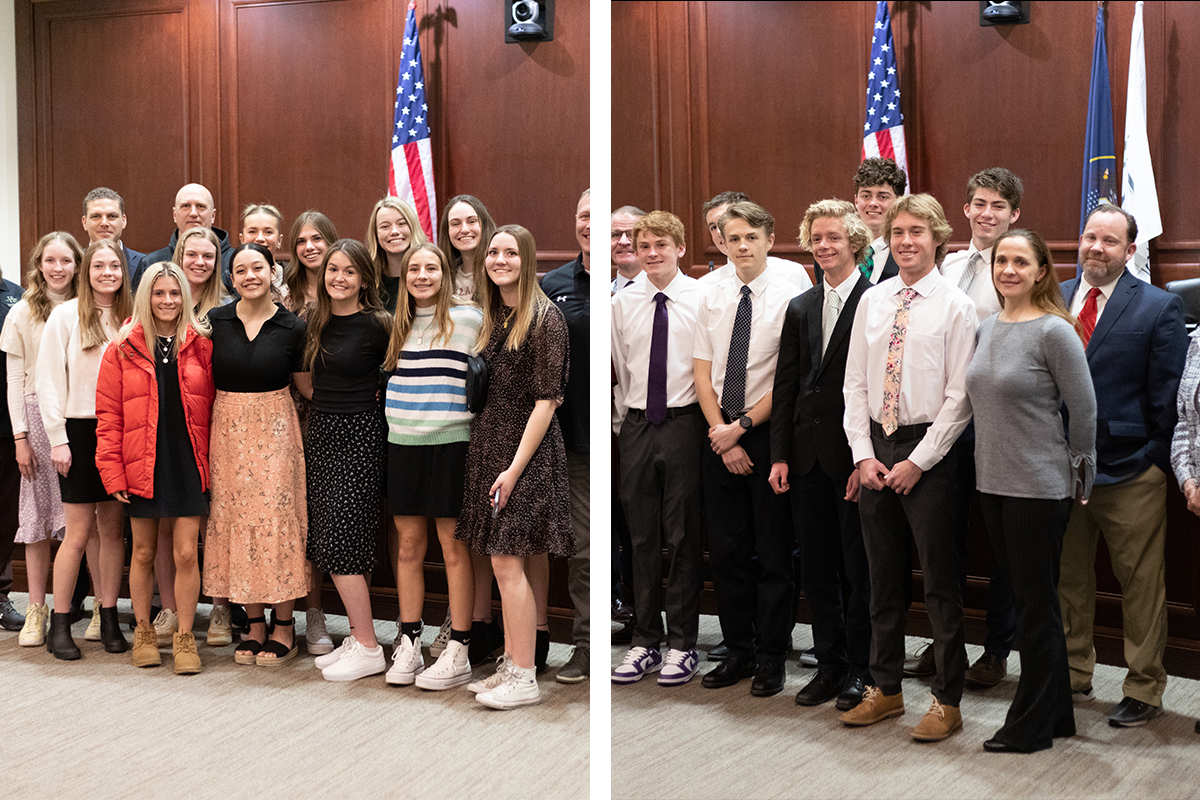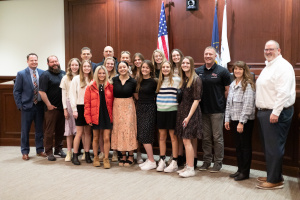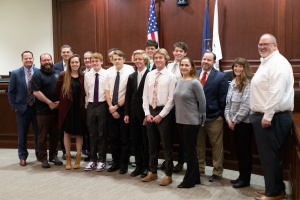5355 West
Herriman Main Street
Herriman, UT 84096
City Council Recap
March 8, 2023 | General Meeting
Voting
- 5-0 approving an updated Transportation Master Plan
- 5-0 approving a petition for annexation of 30 acres owned by Kennecott along 11800 South
- 5-0 approving a new Impact Fee Facilities Plan, Impact Fee Analysis, and Impact Fee Enactment
- 5-0 approving the Consent Agenda, which includes the monthly financial summary
General Meeting
City Council recognitions
The Council formally recognized:
- Mountain Ridge Volleyball team, who recently finished second in the state tournament
- Herriman High School cross country team, who recently finished third at the Nike Cross National races
Public comments
- A resident, representing a group of property owners along Main Street, expressed frustration over the process of the City's right-of-way acquisition for the Main Street project
- A resident expressed concern that he has the same house number as his neighbor across the street and asked the City for help or to be pointed in the correct direction to address the issue
- The owner of Ace Hardware asking for any help the City can provide to help mitigate parking overflow from VASA fitness
City Council board and committee reports
- Councilmember Hodges, representing the South Valley Sewer District board, noted an upcoming change of the general manager after a pending retirement
- Councilmember Ohrn, representing the Jordan Valley Water Conservancy District board, noted that this is a very good winter for water but conservation is still needed because of several years of severe or exceptional drought
Transportation master plan
The Council adopted an updated transportation master plan, which serves as a long-term guide for phasing and constructing roadway projects in the city. It is a backbone for other master plans for the City. The City and a consultant analyzed current and planned roads and used models to project what new roads and improvement projects will be needed to address increased traffic due to growth.
Broadband task force
The City has been working toward a long-term goal for implementing a high-speed fiber optic network. In this meeting, the Council approved a contract for $58,000 with Strata Networks to create a high-level design, identify key routes and distribution areas, and an estimated cost of the full project.
Impact fee facility plan, analysis, and enactment
To collect impact fees from developers to offset the costs of new growth, the City is required to have an impact fee facilities plan to identify which projects are eligible to be paid with impact fee funds. Additionally, the City updated its impact fee amount. In the public hearing, a resident expressed concern that the numbers representing impact from various types of land uses were not fully analyzed. The Council and staff responded that impact numbers are based on a national standard from the Institute of Transportation Engineers.
Work Meeting
Auto Mall public infrastructure district
The Auto Mall developer requested a change in the area's public infrastructure district governing documents—which control how the auto mall is financed by the developer—to increase the maximum bonding amount. That amount is repaid over time by future commercial property owners in the auto mall district. The bond is not tied to City finances. The Council is agreeable to the change.
Secondary water report
The Director of Public Works presented an overview of the City's efforts for non-culinary water infrastructure since the City passed an ordinance in 2004 to require installation and expand pipelines throughout the city. Providing secondary water infrastructure has pros, like reducing the demand for culinary water in landscape watering, and cons, like the high costs of long-term expansion, charging with water, and maintenance. The Council discussed whether it was worth spending the money long-term on a secondary water system expansion when water conservation efforts will be ongoing permanently. A concern was also expressed that because secondary water is generally cheaper to use, making it available may result in more water use than is desired in conservation efforts.
Olympia master development agreement discussion
The Olympia developer proposed a few amendments to its master development agreement, including increasing the likelihood of a minimum commercial requirement, allowing for the possibility of more flexibility in the developer's financing mechanisms, and eliminating the requirement for secondary water in portions of the development. The developer feels there won't be any residential subdivisions in those zones that will meet the size threshold for requiring secondary water. The Council debated whether it was worth the higher up-front cost to charge the secondary water lines to save smaller amounts of money long-term.
Sentinel Ridge detention pond discussion
The City owns the stormwater detention pond at Sentinel Ridge Drive and Rosecrest Road. The Rosecrest development group has intended to finish that area into a park and asked if the City would be willing to deed it back to them to finish at their cost. It is not currently on the City's capital improvement projects plan. The City Council is agreeable if the City can get some assurance that the park will be finished and not neglected.
Meeting video:

 RSS Feed
RSS Feed



 Add to Favorites
Add to Favorites